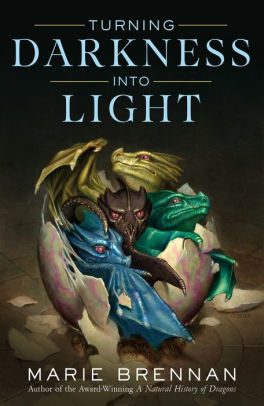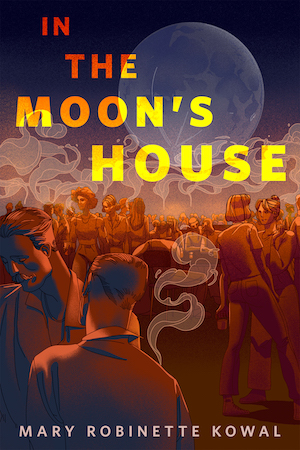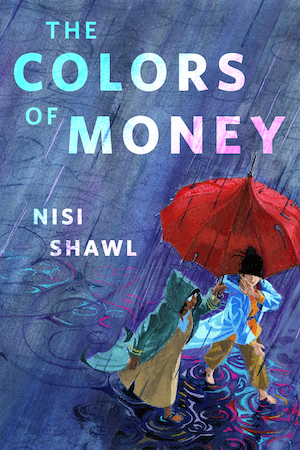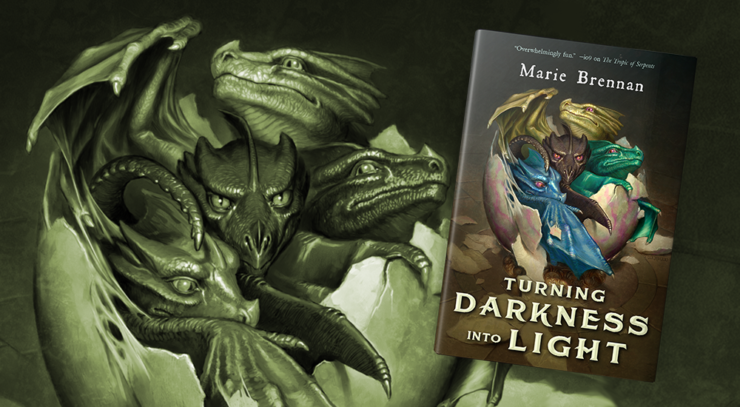Marie Brennan’s Turning Darkness Into Light is a delightful fantasy of manners, set in the same alternate Victorian-esque fantasy landscape as her Natural History of Dragons series.
As the renowned granddaughter of Isabella Camherst (Lady Trent, of the riveting and daring Draconic adventure memoirs) Audrey Camherst has always known she, too, would want to make her scholarly mark upon a chosen field of study.
When Lord Gleinheigh recruits Audrey to decipher a series of ancient tablets holding the secrets of the ancient Draconean civilization, she has no idea that her research will plunge her into an intricate conspiracy, one meant to incite rebellion and invoke war. Alongside dearest childhood friend and fellow archeologist Kudshayn, must find proof of the conspiracy before it’s too late.
Turning Darkness Into Light is available August 20th from Tor Books. Read an excerpt below!
STUPENDOUS FIND IN AKHIA
Newly Discovered Cache of Draconean Inscriptions Lord Gleinleigh’s Triumph
“True history will be revealed at last”
Though nearly barren of water, the deserts of Akhia are a wellspring of secrets. Year by year, their sands disclose the remains of the ancient Draconean civilization, which has fascinated the public for hundreds—nay, thousands—of years.
Today they have given into the hands of mankind a priceless treasure, nearly the equal of the Watchers’ Heart itself: a tremendous cache of inscriptions, hidden by unknown hands in the deepest recesses of a cave, lost to memory until now. An expedition led by Marcus Fitzarthur, the Earl of Gleinleigh, ventured into the barren region known as the Qajr, where archaeologists had little hope of significant discovery. While sheltering from the midday heat, the earl himself found the cache, containing hundreds of tablets never before seen by modern scholars.
What hands buried them in the sheltering earth of that cave, so far from any settlement yet discovered? Was this the act of some ancient hermit or miser, protecting his library against the eyes of others? Was it an attempt to safeguard these texts against the violence of the Downfall that ended Draconean rule? We may never know, unless the words themselves give some hint to their value or origin. But the content of the tablets is as yet unknown; Lord Gleinleigh insisted on their prompt removal, before looters could flock to the site and steal away this priceless treasure. He is already making plans to bring them to his estate at Stokesley, where he has amassed one of the most extensive private collections of Draconean antiquities in the world.
When approached for comment, Simeon Cavall of the Tomphries Museum offered the following statement: “We congratulate Lord Gleinleigh on his stroke of good fortune, and hope that the world shall not find him behindhand in sharing the details of this cache with the public.”
From: The Office of the Curator of Draconean Antiquities
To: Alan Preston
14 Nivis Tomphries Museum
#12 Chisholm Street, Falchester
Dear Alan,
All right, you win. Lord Gleinleigh is every bit as insufferable as you warned me. I drove through the dark just to stay at an inn, rather than accept that man’s hospitality for the night.
His private collections are every bit as stupendous as rumour claims, but it’s hard for me to admire anything when I know he must have acquired half of it in shady overseas markets, and the other half from our own shady markets here in Scirland. He is exactly the kind of customer Joseph Dorak and his ilk like to cultivate: he clearly cares nothing for the artifacts in their own right, only for the prestige they bring him, especially the Draconean materials. When I think of the bas-reliefs alone—treasures chiseled off their original homes to decorate the walls of that hulk he calls an ancestral estate, and probably smuggled onto our shores—I tell you, I could weep. The Akhian government would never have given him permission to search the Qajr if they’d had the slightest clue he would find anything of value there. Now he is in possession of what the papers insist on calling “the greatest archaeological find since the Watchers’ Heart” (bah—I’ll lay odds he bought that coverage himself), and there is nothing anyone can do about it.
Buy the Book


Turning Darkness Into Light
I cannot decide whether it would be better or worse if he had any facility at all for languages. Such knowledge would give him a greater appreciation for what he has found; on the other hand, he would probably undertake to study the inscriptions himself, and undoubtedly make a botch of it, for he has not the dedication to do it well. As it stands, Lord Gleinleigh is so jealous of his find that I had to argue with him for hours before he would even let me see the whole of it, rather than a few scattered tablets—never mind that I cannot possibly be expected to deliver a well-informed judgment on the material if I have no information to judge from.
But I finally convinced him, and so here is the long and short of it.
The cache consists of two hundred seventy-one tablets or fragments thereof. Some of those fragments likely belong together; there are at least three pairs I’m certain of, but a great many more that would require further examination. If I had to guess, the final count will be closer to two hundred thirty.
Their condition is highly variable, though it’s unclear how much of that is due to botched conservation. Credit where it is due; Gleinleigh did have the sense to attend to that right away, so we hopefully shouldn’t see any more salt damage. But some of the tablets are fairly weathered (from before their burial, I imagine), and a few have suffered extensive surface crumbling, which I fear will make decipherment of those sections difficult, if not impossible.
In terms of subject matter, they’re an assortment, and I didn’t have enough time to do more than make a quick assessment. Some queen lists; a few carved into limestone that look to be royal decrees; quite a lot that appear to be completely prosaic tax records. (I sometimes think the literary production of Draconean civilization was fifty percent tax records, if not more.)
But as for the rest… yes, the rumours are true, or at least I think they are. Fourteen of the tablets are shaped to a uniform size and thickness, with what looks like the hand of the same scribe at work on them. They seem to form a continuous text, judging by the notably archaic nature of the language—it’s riddled with obsolete signs, which made assessing anything quite a challenge. What little I was able to parse at a glance seems to be a narrative. Whether Lord Gleinleigh is right to call it the “lost history of Draconean civilization” I cannot say without further examination, but it is unquestionably a breathtaking find.
And completely wasted on such a man.
However, there is hope! Given how reluctant Gleinleigh was to let me see the tablets, I thought I would have to spend months persuading him to have them translated and published. But apparently he recognizes that no one will care about what he has found five years from now unless they know what it says, because he suggested translation before I could even bring it up. What’s more, I have persuaded him that the dignity of his ancient name requires the greatest care and attention be given to these tablets. Your mind has already leapt in a certain direction, I’m sure, but I shall surprise you by steering you two generations down: I think we should recruit Audrey Camherst.
In my opinion she is easily her grandfather’s equal, where knowledge of the Draconean language is concerned. Furthermore, she has the advantage of her sex. You yourself said that Lord Gleinleigh treats every man who comes near him as either an inferior or a threat to his own prestige, neither of which would serve us well in this instance. Miss Camherst, being a woman, will not provoke him to such displays of superiority. And if he does try to throw his weight around—well, Audrey has her grandmother’s name to use as weapon and shield alike. Given that her family’s attentions are currently focused on preparing for the Falchester Congress next winter, I doubt her grandfather could spare the time and care this task would require, but Audrey would leap at the chance.
I have not yet recommended her to Lord Gleinleigh’s attention, as I think the lady deserves some amount of warning before I drop him on her doorstep. But unless you have a strong argument to the contrary, I intend to write to her as soon as possible. The world is panting to see what those tablets have to say, and we should not make them wait.
Your friend,
Simeon
From the diary of Audrey Camherst
4 pluvis
Arrived at Lord Gleinleigh’s estate today, in a torrential downpour that transformed me into a drowned rat in the brief interval between motorcar and door. Wouldn’t have happened if his footman had the common sense to keep an umbrella in the car. Bad service? Or calculation on Lord Gleinleigh’s part? I know Simeon doesn’t think the earl will feel the need to posture at me, since I’m not a man, but I am unconvinced. My impression, based on an admittedly short acquaintance thus far, is that he’s utterly delighted that the granddaughter of Lady Trent herself has come all this way to look at his tablets—but from what Simeon said Alan said, I can’t help but wonder if he fears the stories will start being all about me, instead of him. Letting me get soaked might be his way of putting me in my place.
If being put in my place is the entry fee for seeing the tablets, I will pay it. From what I hear of him, Lord Gleinleigh’s usual habit is to huddle over his find like a mother dragon brooding over her eggs. (Why is it that we still use that simile, even though Grandmama has made it clear that most of them don’t brood?) It is nothing short of a miracle that he is eager to see his new find published, and I can’t quite trust that he won’t change his mind. If he does… well, I am not above smuggling out copies of my papers, and the consequences be damned. Father will bail me out, I’m sure. Then I can look all tragic and determined for the press, who will eat it up with a spoon.
Lord Gleinleigh was taken aback when he saw me, and I don’t think it was because of my soaking. People have a tendency to forget who my mother is, even though anything our family does becomes headline news. They expect me to look Scirling, and are always surprised when I don’t.
But he recovered quickly, I will give him that much. “Miss Camherst,” he said, offering the appropriate courtesies. “Welcome to Stokesley. I am sorry your journey was so fatiguing.”
“It’s like the monsoon out there,” I said, dripping steadily onto his marble floor. “But that’s all right. I would have swum all the way here if that’s what it took. When can I get started?”
That took him aback again. “With the—My dear girl, you only just got here! I would not dream of putting you to work so soon.”
It always sticks in my craw when someone calls me “girl.” I am twenty-three, and a grown woman. But I’m likely to be a girl in everyone’s eyes until I’m grey or married. “You’re not putting me to work,” I said. “I’m putting myself. Really, I can’t wait to see the tablets. Just let me towel myself dry—”
Of course I was wasting my breath. First I had to be shown to my room. Then Lord Gleinleigh’s maid tried to insist on drawing a bath, saying I must be chilled to the bone. Which I was, a little, but I didn’t care. I did dry myself off, and then happened to glance in a mirror and discovered my hair was going every which way, as it does when the weather is damp. The maid wanted to fix that for me, but it was obvious she didn’t have the first notion how to subdue my mane. I pinned it up myself, put on dry clothes, and sallied out again in search of my host and my purpose for being there.
Only of course he had to take me on a tour of the family pile, entirely so he could show off his collection. The man has no taste! Nor any sense of order whatsoever. He has crammed Nichaean friezes around Coyahuac frescos with a monstrous great Yelangese vase in front of them so you can hardly see what’s behind. And the Draconean antiquities… I don’t think he knows or cares that he has hatching murals looming over mortuary stele in a way that would have appalled the ancients. But Simeon warned me, so I oohed and aahed as expected, and only made faces when his back was turned.
Eventually we got down to business. Lord Gleinleigh said, “I should tell you, Miss Camherst, that I have some requirements for this undertaking. If they are agreeable to you, then you may begin work tomorrow.”
No wonder he hadn’t shown me the tablets yet. Mind you, he could have had the decency to inform me about these “requirements” before I came all the way out here… but Lord Gleinleigh isn’t a complete fool. He knew it would be that much harder for me to refuse when I was in the same building as the tablets, separated from them only by a few thin walls. “I should be glad to hear your requirements,” I told him, as politely as I could.
“They are not onerous,” he promised me. “The first is that I will need you to work here, rather than removing the tablets elsewhere. I shall of course provide room and board as part of your compensation for as long as you require, and make arrangements for your belongings to be brought here.”
Live at Stokesley! I shouldn’t be surprised; it’s entirely reasonable for studying materials in someone’s private collection. But from what Simeon said, this won’t be a quick job. I’ll be here for months.
I could hardly argue, though. “Quite right. I don’t think I’ll need much; I’m used to living on ships, with all my belongings crammed into a single trunk, and most of that filled with books.”
He nodded in a way that made it clear he was entirely uninterested in my personal life. “The second is that I do not want word of the tablets’ contents leaking out until I am ready to present them in their entirety. Given bits and pieces, people will speculate and form all kinds of theories. I would rather they have the whole text at once.”
Diary, I almost squawked in frustration! Of course he wants to make a grand reveal of the whole text—and to be honest, I don’t entirely blame him. It will be much more exciting if people can read it all at once, even if the more usual thing would be to publish portions as I go along. But given the length of the main text, that means I will have to wait for ages before I can share it with the world!
Then I thought through what he had said. “When you say ‘leaking’…”
“I mean that you will not be permitted to share information about it with anyone. Not until you are done. I’m afraid I must insist on security, Miss Camherst—I’m sure you understand.”
Oh, I understand. He is a greedy old worm, that much is clear, and he doesn’t have the first idea how such things work. “But what if I run into difficulty? It’s common practice to consult with other scholars along the way.”
He affected surprise. “I was given to understand, Miss Camherst, that you are one of the brightest minds in your field. Your grandfather was a pioneer in deciphering the language, and your grandmother—well, her reputation is known around the world. Dr. Cavall at the Tomphries told me that you began studying Draconean writing when you were six. But if you need to consult with others, perhaps I should approach one of them instead.”
I went hot all over. “What I mean is—ancient texts are often very unclear. I might need to compare what you have against different tablets, things at the Tomphries or in private hands.” That’s only one of the reasons, but it was the only one I could think of that he wouldn’t hear as a confession of incompetence.
He said, “Surely you can do that without needing to divulge what you yourself have learned.”
I can; it will only be a tremendous annoyance. And yet… the alternative is to not work on these tablets at all. He knew very well how much they tempted me, and how much he had needled my pride.
So I agreed. Of course I agreed. How could I do otherwise?
“Excellent!” he said, with such heartiness that I think he may have been genuinely worried that I would refuse. “You can start work first thing tomorrow, then. I’ve even lined up an assistant for you.”
The hypocrisy of that man! First I must keep everything secret; then he drops some stranger on me, saying nothing except that I will meet her tomorrow. And before I could tell him what I thought of that, he asked me how soon I thought I could be done.
My first instinct was to laugh in his face. How can I predict such a thing without first studying the text? But I have better self-control than that, whatever Simeon says. And I have Simeon’s report on the size of the tablets, the density of the script, and its archaic cast, which is enough to make at least a rough estimate. “A great deal will depend on how obscure the text is, you understand. But from the quantity, I would guess perhaps two tablets per month.”
“Splendid,” Lord Gleinleigh said, slapping his knee. “That will do very well, Miss Camherst.”
He was so satisfied, in fact, that I gave him a suspicious look. “I should be clear. Two tablets a month if it goes well, which it may not. And that is only for a first draft—something that gives a clear sense of the text’s meaning. Polishing it, making sure my translation is as accurate as I can achieve, will take a good deal longer.”
Lord Gleinleigh waved away my comment. “Of course—I’m sure it will need more study going forward—but the important thing is to know what it says, yes? The finer points can wait. You might be ready for publication by, say, next Gelis?”
Ten months from now. If he were only doing the simple arithmetic of seven months for fourteen tablets, he would have said Fructis; if he were speaking generally, he would have said a year or so. Gelis is both random and specific.
And I could guess why.
Maybe it would have been better for me not to have said. But I was calculating in my head, and when I got to my conclusion, it just popped right out of my mouth. “You mean, before the Falchester Congress.”
Really, I should have seen it coming. Why else would he be so eager to have someone translate these tablets, when up until now he’s hidden his collections away for the enjoyment of himself and his friends? Because the congress will be taking place next winter. Everyone will be thinking about the Draconeans then, with their delegation coming here and the future of the Sanctuary up for international debate; the translation will positively fly off the shelves.
He coughed delicately. “It would be convenient, yes.”
Not to mention profitable. With the way he spends money on antiquities, you’d assume he must be rolling in money, but I hear that lots of peers these days are having difficulty keeping up their estates. Maybe he’s gotten himself into debt. Or maybe he just wants more money to buy even more antiquities with. Either way, he’ll be able to do it, if this translation comes out on time—not to mention that he’ll be famous.
And so will I.
That shouldn’t be the first thing on my mind. I should take my time with this text, and make certain it isn’t published until I’m absolutely convinced it’s the best I’m capable of delivering—even if that means it doesn’t come out until I’m forty. Fame means nothing if later people say, “Oh, Audrey Camherst? You mean the one who wrote that sad little attempt at translation a few years ago?”
But it’s so hard when I can feel everyone looking at me, waiting to see what I’ll do. Not my family, of course; if I decided I wanted to retire to a country cottage and spend my life growing roses—not even award-winning roses; mediocre, aphid-chewed ones—they would hug me and wish me well. It’s the rest of the world that expects me to do something spectacular, because Papa did, and Mama, and Grandpapa, and above all Grandmama. When am I going to prove my right to stand with them?
I don’t have to prove anything.
Except to myself.
And I know I can do this. If it means working long hours to get it done in time… well, that’s what coffee is for.
Excerpted from Turning Darkness Into Light, copyright © 2019 by Marie Brennan.










